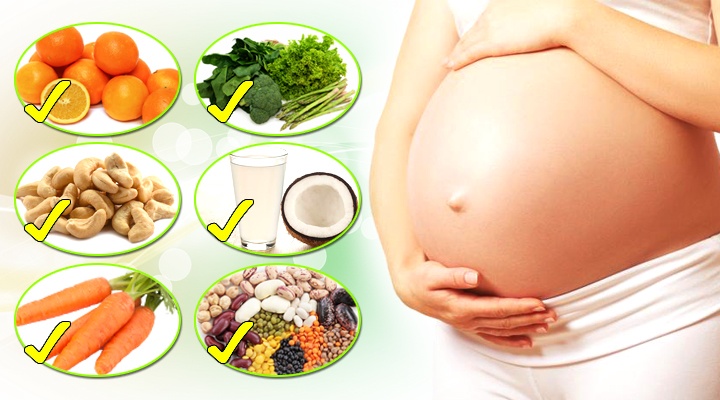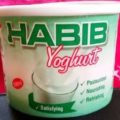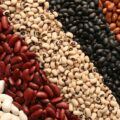Many foods we love to eat in Nigeria are unhealthy during pregnancy. Nigeria has a large variety of foods and vegetables which can be blended creatively to provide healthy meals. There are traditional ways of cooking many Nigerian dishes and modern ways as well but the goal during pregnancy is to promote the health of the mother and her unborn child.
Eating a nutritious diet during pregnancy is linked to good brain development and a healthy birth weight, and can reduce the risk of many birth defects. A balanced diet will also reduce the risks of anemia, as well as other unpleasant pregnancy symptoms such as fatigue and morning sickness.
Key Nutrients You Need During Pregnancy
According to the American College of Obstetricians and Gynecologists (ACOG), you and your baby need these key nutrients for a healthy pregnancy:
Calcium: Helps to build strong bones and teeth. Main sources include milk, cheese, yogurt, and sardines. During pregnancy you need 1,000 milligrams (mg) daily.
Iron: Helps red blood cells deliver oxygen to your baby. Sources include lean red meat, dried beans, peas, and iron-fortified cereals. During pregnancy you need 27 mg daily.
Vitamin A: You need this vitamin for healthy skin, eyesight, and bone growth. Carrots, dark, leafy greens, and sweet potatoes are good sources. During pregnancy you need 770 micrograms daily.
Vitamin C: Promotes healthy gums, teeth, and bones, and helps your body absorb iron. Good sources include citrus fruit, broccoli, tomatoes, and strawberries. During pregnancy you need 85 mg daily.
Vitamin D: Aids your body in the absorption of calcium to help build your baby’s bones and teeth. Sources include exposure to sunlight, fortified milk, and fatty fish, such as salmon. During pregnancy you need 600 international units (IUs) daily.
Vitamin B6: Helps form red blood cells and helps your body use protein, fat, and carbohydrates. You can find vitamin B6 in beef, liver, pork, whole-grain cereals, and bananas. During pregnancy you need 1.9 mg daily.
Vitamin B12: Helps form red blood cells and maintains your nervous system. You can find this vitamin only in animal products. Good sources include liver, meat, fish, poultry, and milk. During pregnancy you need 2.6 micrograms daily.
Folate (Folic Acid): A B vitamin important in the production of blood and protein, it also reduces the risk of neural tube defects (a birth defect of the brain and spinal cord). You can find folate in green, leafy vegetables, liver, orange juice, legumes (beans, peas, lentils), and nuts. You must get at least 400 micrograms of folate daily before pregnancy and during the first 12 weeks of pregnancy to reduce the risk of neural tube defects. During pregnancy, doctors recommend you get 600 micrograms daily. SEE: List of Healthy Nigerian Foods Rich In Calcium
Weight Gain
Weight gain is important during your pregnancy and something you and your doctor will monitor for nine months until you give birth. However, gaining too much or too little weight can contribute to problems during your pregnancy for both you and your baby. Just because you are eating for two doesn’t mean you should eat twice the amount of food. If you are a healthy weight before your pregnancy, you only need to eat an average of about 300 extra calories a day.
List Of Nigerian Food To Eat During Pregnancy
- Green Vegetables
- Beans
- Bread
- Rice
- Spaghetti or pasta
- Fruit especially green apple
- Fufu and fresh vegetable Soups
- Oats meal
- Banana
- Semovita with rich vegetable soup
- Yoghurt
- Fruit smoothie made with some low-fat milk
- Fresh fruit Juice
- Akamu
- Fura
- Kunu
- Custard
- Spinach.
- Carrots
- Eggs
- Soya Milk and foods
- Pumpkin seeds
- Sweet Potatoes
- Amala with ewedu
- Pounded yam
- Fish
Popular types like catfish, clams, cod, crab, pollock, salmon, scallops, shrimp, tilapia, trout, and canned tuna are all not only safe fish, but healthy fish to eat during pregnancy.
Foods to relieve pregnancy nausea
Simple, easy-to-digest foods that contain some flour and carbohydrates. Bread, toast, crackers, rice and pasta are fine.
Non-complex, watery broths that contain filaments of meat or chicken and some root vegetables. Don’t serve yourself too much at any one time and stop when you feel you’ve had enough. You are much better off retaining ½ cup of soup in your stomach than vomiting it all back up.
Avoid eating foods that are high in salt and will make you thirstier. Too much salt leads to water retention and excess swelling. In excessive amounts, it can also increase blood pressure.
Ginger is said to work wonders for many women and it won’t do you or your baby any harm. Try the full range available, starting off with some freshly grated, raw ginger seeped in hot water. Sip on this when you feel queasy and can’t face the pantry. Try making your own gingerbread biscuits and cake, experimenting with different amounts of powdered/dried ginger.
A glass of chilled water with a squeeze of fresh lime or lemon juice can be settling. Try munching on some ice chips or even a water-based/cordial ice-block. Lime, raspberry and lemonade are some tried and tested favorites when simply nothing else will do.
Chilled foods such as jelly, dairy desserts, fromage, rice cream and rice puddings work for some women.
Sour fruits that activate your taste buds and feel more astringent to the tongue. Green apples, persimmons, grapefruit and oranges can all be effective.
Dealing with cravings
There is thought to be some biological basis for food cravings during pregnancy. Your body may yearn for foods that will supply it with important nutrients to stay well and to nurture your growing baby.
Give into your food cravings if they’re reasonable and are for real food. Occasionally, pregnant women will experience Pica which means they will crave and eat non-edible foodstuffs such as sand, coal, paint and dirt. Ingesting these substances is obviously risky and can potentially be lethal to a developing baby (rather let your doctor check your iron levels before you give in to this type of craving).
Be prepared to move on from even your most adored craving to something completely new and interesting. Different stages of pregnancy make different demands on the body and this is often reflected in what you really feel like eating.
Breakfast
Muesli with rolled oats, chopped nuts, fruit and grated (green) apple. Aim to use low-fat milk that will supply you with calcium and phosphorus.
Any quality of whole grain cereal that is low in fat, but high in fibre and essential nutrients. Read and compare nutritional information on the boxes and look for the percentages of sugars and fats and what the RDI (Recommended Daily Intake) is during pregnancy.
Any grain that resembles its original state is usually a preferable option for a breakfast cereal, e.g. oats and bran have not been processed so much that their nutritional content has been lost.
Freshly cut fruit with low-fat yoghurt poured over the top. Sprinkle some sesame seeds on for extra B group vitamins. If you can’t access fresh fruit, use frozen, canned or preserved fruit, which – if prepared correctly – will have retained much of their original nutrients.
Multi-grain toast with a quality spread or a protein topping. Try combinations such as cheese and tomato, avocado and cottage cheese, or bacon and syrup.
Eggs cooked any way – but make sure they are properly cooked to reduce the risk of contracting salmonella.
Leftovers are fine as long as they have been stored correctly and not reheated previously.
Freshly squeezed juice made from at least two pieces of fruit.
Mid-morning snack
Be inventive and break out of your usual snacking routine. Your baby needs to be exposed to lots of different tastes and flavours so it is automatically more receptive when it comes to accepting solid foods.
Aim for fruit, preferably a couple of servings. Wash all fruits thoroughly to remove residual traces of dirt and chemicals. Vary your diet – buy fresh fruit a couple of times a week and add one new fruit, which you don’t generally eat, each week.
Hard cheese with crackers. Avoid soft cheeses such as brie and camembert. Cheese is a solidified form of milk and a couple of small cubes will provide one quality serving of calcium each day.
Yoghurt or a fruit smoothie made with some low-fat milk, fresh fruit and ice.
A handful of dried nuts or dried fruits. Look for dried fruits that are sun dried, rather than dried using sulphur agents. Dried fruit absorb a lot of water in the gut and can lead to excess wind and bloating. So although they taste delicious and it’s hard to stop once you start, go easy. Take some out of the packet and then seal it up again to avoid going overboard.
Lunch
A quality salad with a variety of greens and leaves. Look for as much color as you can to combine and fill your plate with living, whole foods. Include some avocado. Wash all salad vegetables very well and store, airtight, in the refrigerator.
Wholegrain or wholemeal bread with a dairy spread. Margarine or butter is fine and will supply your body with vitamin D, and some essential fats. Lean meat such as chicken, ham, beef or lamb with or without salad is ideal.
Leftovers are good; especially those containing some source of protein and vegetables. Pasta dishes, risotto, soups, stews, or casseroles are all good options, particularly in the winter months.
A tin of fish such as sardines, mackerel or salmon with a salad. Follow up with a tub of yoghurt or a glass of milk, a hard cheese or a dairy dessert that would provide another calcium serving.
Late afternoon snack
Similar to morning tea in terms of serving size and food range. Consider morning and afternoon tea as snacks, rather than main meals. They will help to maintain your blood sugar levels at a reasonable level, stave off hunger and help avoid nausea:
Freshly squeezed fruit or vegetable juice. Invest in a juicer and experiment with different combinations. Remember, it is the fibre in them that makes us feel full, so without it there can be an intense concentration of kilojoules in every glass. Sip it with a straw and include ice in the glass as well.
A muffin or bagel spread with some jam or honey will satisfy your mid-afternoon sugar craving. It will also help fuel you through the energy slump that is so common around this time.
Dinner
Home-made soup containing some lentils, split peas, vegetables and a protein source such as meat or chicken.
An egg dish is fine if you couldn’t be bothered with too much cooking. An omelette, scrambled, poached, boiled or in a quiche, whatever takes your fancy.
Meat, chicken, fish serve with steamed, seasonal vegetables or a salad.
For a vegetarian option try baked beans or lentils combined with vegetables to make a nutritious and healthy non-meat meal.
Late night snack
A warm milk drink mixed through with some malt or healthy additive.
A couple of biscuits, some cheese and crackers or another piece of fruit.
A handful of nuts or seeds can satisfy the common desire for crunchy foods, which require some chewing. One serving of stewed or tinned fruit with custard can also satisfy a sweet craving.
Proximate Composition of Some Popular Nigerian Foodstuffs
| Food Item (100 g) |
Protein (g) |
Carbohydrates (g) |
Fats (g) |
Ca (mg) |
Fe (mg) |
Niacin (mg) |
| Milk (condensed) | 12.0 | ? | 1.8 | 64 | 1.3 | 8.8 |
| Eggs (hen) | 11.8 | 0.6 | 9.6 | 45 | 2.6 | 0.3 |
| Beef | 18.2 | ? | 17.7 | 11 | 3.6 | ? |
| Pork | 12.4 | ? | 40.5 | 11 | 3.6 | ? |
| Chicken | 20.5 | ? | 6.5 | 10 | 1.1 | ? |
| Fish (raw mackerel) | 19.0 | ? | 1.8 | 64 | 1.3 | 8.8 |
| Stock fish | 21.8 | ? | 5.4 | ? | ? | ? |
| Crab | 31.2 | 9.6 | 7.7 | 1,280 | ? | ? |
| Edible caterpillars | 62.3 | 6.5 | 4.6 | 513 | 6.9 | 4.2 |
| Ground-nuts (roasted) | 23.2 | 21.7 | 50.9 | 42 | ? | 15.3 |
| Locust beans(dawadawa or iru) | 39.7 | ? | 31.4 | 365 | 41.5 | 2.4 |
| Melon seeds (egusi) | 28.4 | ? | 52 | 354 | 8.1 | 35.4 |
| White bread | 8.6 | 50.4 | 3.3 | 83.9 | 2.5 | 2.4 |
| Millet | 7.4 | 77.6 | 1.3 | 397 | 17.1 | 0.8 |
| Guinea-corn | 9.8 | 73.6 | 3.1 | 30 | 15.6 | 3.7 |
| Rice (parboiled) | 7.0 | 79.8 | 0.6 | 6.0 | 2.4 | 5.4 |
| Yellow maize | 10.0 | 73.6 | 4.8 | 13 | 4.9 | 1.7 |
| White maize | 9.4 | 73.6 | 4.2 | 16 | 3.6 | 2.2 |
| Kokoyam | 5.2l7.6 | 88.5 | 0.5 | 6l24 | 0.7 | 0.8 |
Can I eat Indomie Noodles during Pregnancy ?
Noodles are not recommended for women during pregnancy because, it lacks all the important nutrients that you need while pregnant. It is also extremely salty and can possibly lead to hypertension if you eat this day after day. However generally speaking, it’s safe to eat instant noodles in moderation. READ: List of Nigerian Foods and Beverages to Avoid During Pregnancy






